January 21, 2025
SEOUL – Hybe may face restrictions on using its newly introduced facial recognition technology, Face Pass, for concert and event admission. The technology is set to debut at TWS’ first fan meeting in Seoul from Feb. 14 to 16.
Rep. Lee Soo-jin of the main opposition Democratic Party of Korea proposed an amendment to the Personal Protection Act on Jan. 16 to limit Hybe’s use of the facial recognition system, citing concerns about excessive demands for sensitive personal information.
Industry experts have also flagged potential risks, urging a thorough review before implementing such technology to prevent privacy violations or misuse of personal data.
Last August, Hybe, Interpark Triple and Toss operator Viva Republica announced plans to introduce biometric facial recognition technology for concert entry, allowing fans to bypass traditional ID checks and ticket confirmation. Hybe claimed the system would simplify identity verification and improve efficiency.
For the upcoming fan meeting, Hybe stated attendees could choose whether to use the Face Pass system. Those who opt out can follow the standard ID verification and ticket confirmation procedures at on-site booths.
Hybe has yet to decide whether the technology will become mandatory for future events.
Rep. Lee warned that using biometric facial recognition for purposes like preventing ticket scalping could pose significant risks, including deepfake-related crimes.
“The current law lacks specific provisions for biometric data, treating it as sensitive information under the Enforcement Decree of the Personal Information Protection Act,” Rep. Lee said. “We need explicit legislation to address biometric data collection and management.”
Citing recent data breaches that exposed over 780,000 personal records through hacking and illegal access, Lee noted that requiring biometric data for ticket purchases imposes unnecessary risks.
“If biometric data leaks, the data processor will face penalties under the Personal Information Protection Act,” she added.
Lee Jong-im, a lecturer at Seoul National University of Science & Technology’s Graduate School of Public Policy and Information Technology, also criticized private companies for collecting and managing sensitive biometric data. She expressed concern over leveraging fan loyalty to justify such practices.
“The idol fandom comprises a large proportion of teenagers and a global audience. Using fan sentiment to justify data collection for efficiency or scalping prevention is problematic,” Lee told The Korea Herald on Monday.
She further highlighted South Korea’s vulnerability to deepfake-related threats, citing a 2023 report by US cybersecurity firm SecurityHero, which identified the country as the most susceptible to deepfake content globally.
“The entertainment industry must rethink how it handles fan information. Companies like Hybe’s Weverse (global fandom platform) and DearU’s Bubble (artist-to-fan communication platform) collect vast amounts of fan data, yet their data management systems remain unclear,” she said.
“Fans are individuals who support their idols, not just data points. Ensuring personal choice, secure data management and ethical practices is critical when handling sensitive information,” she added.


